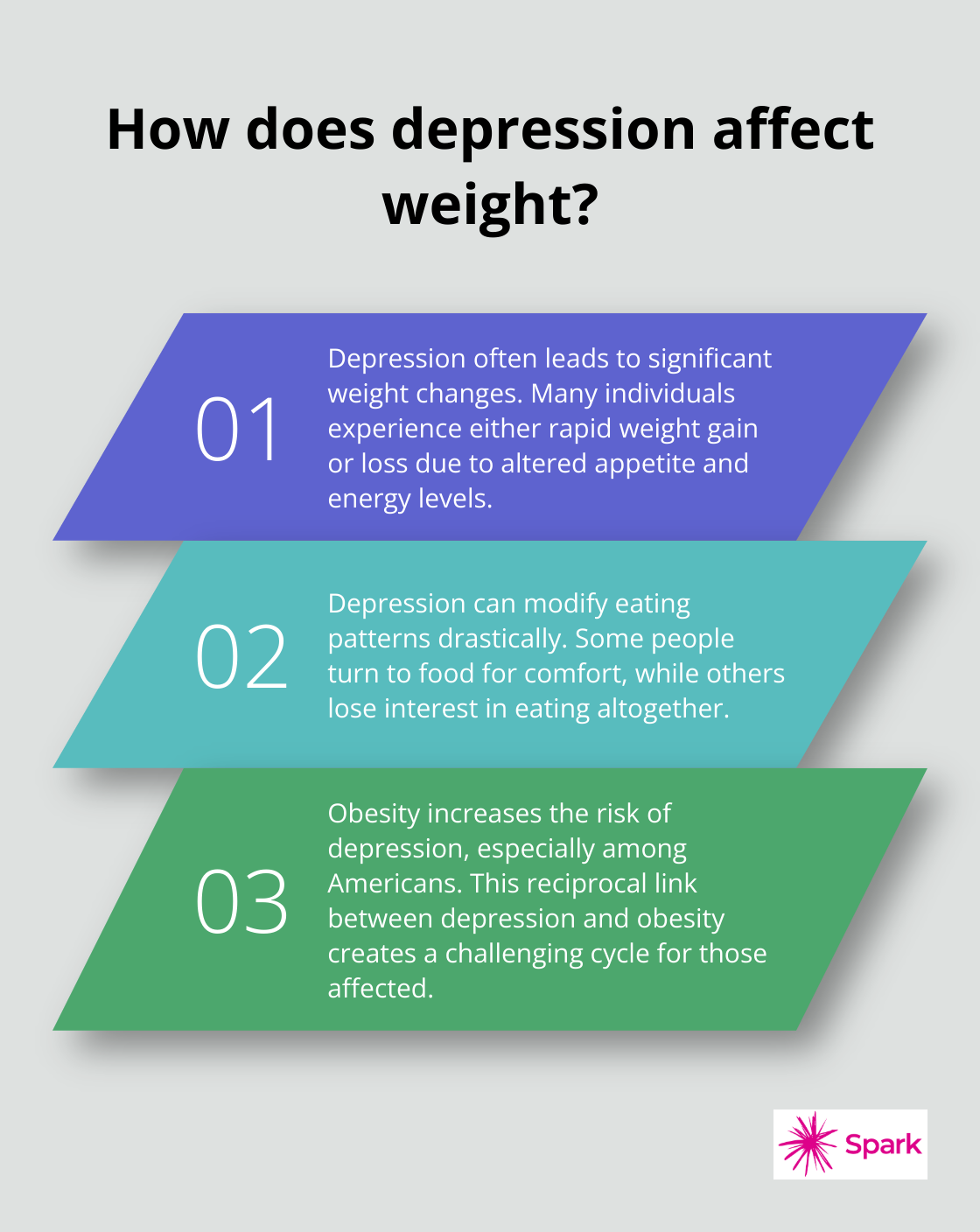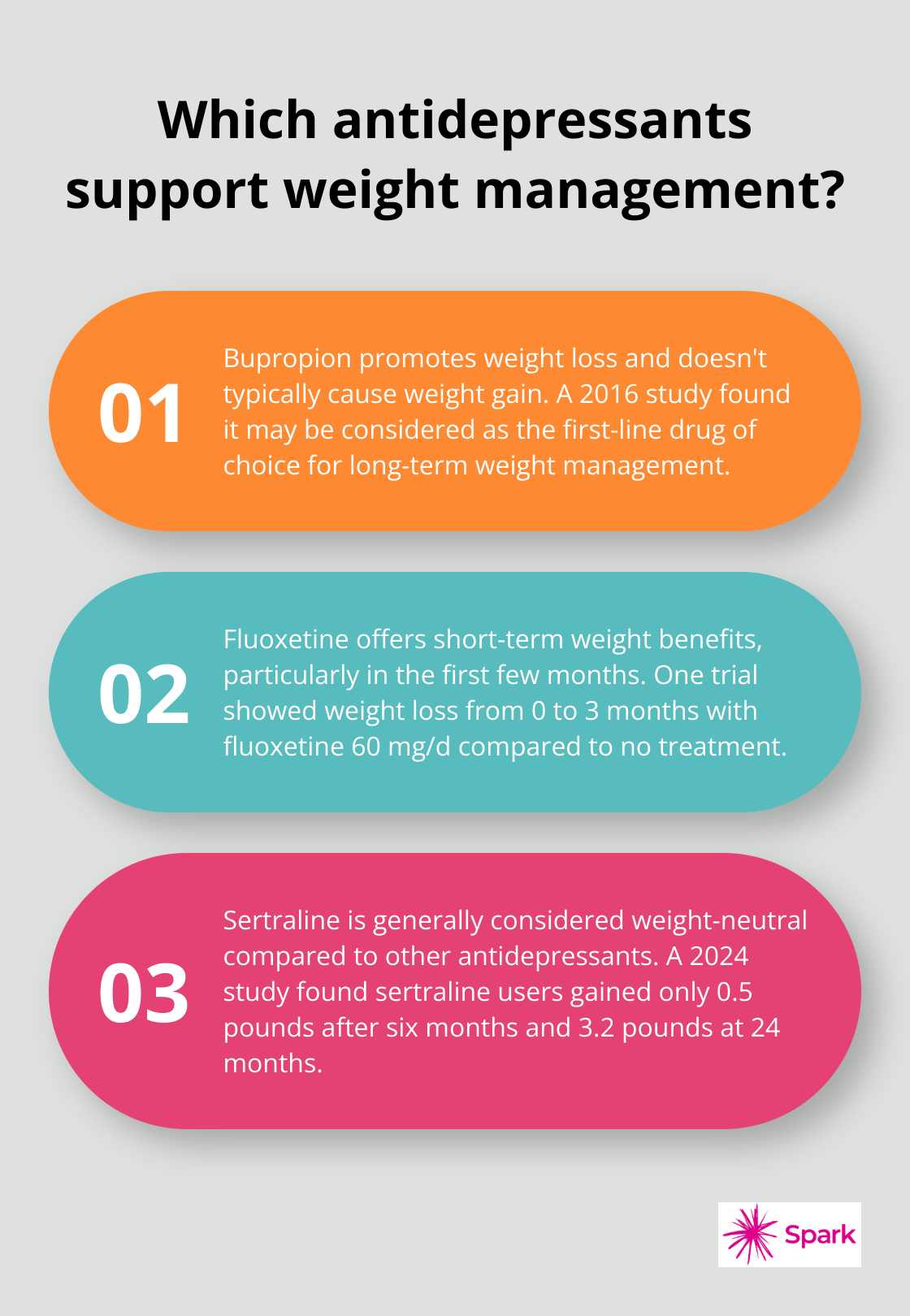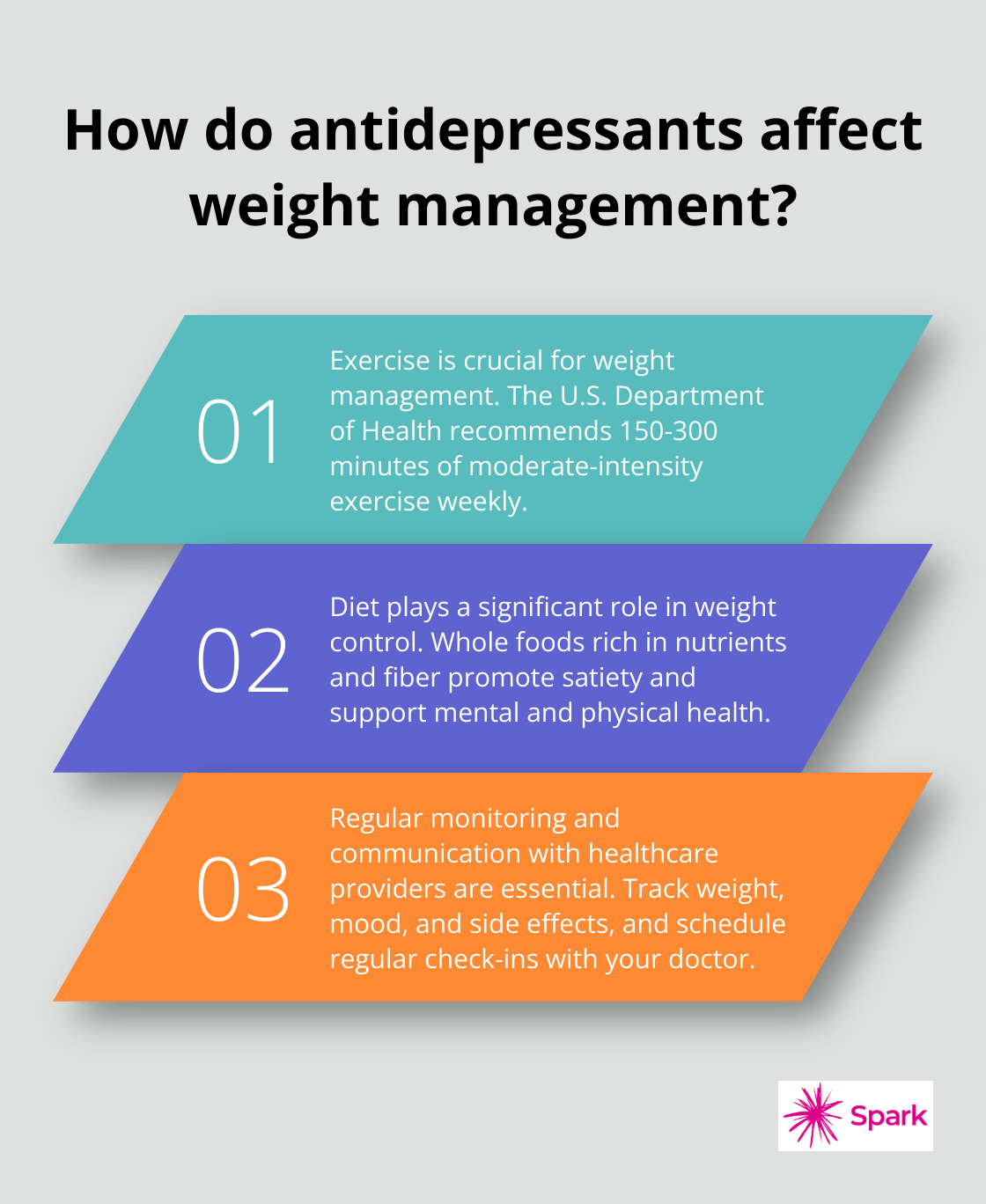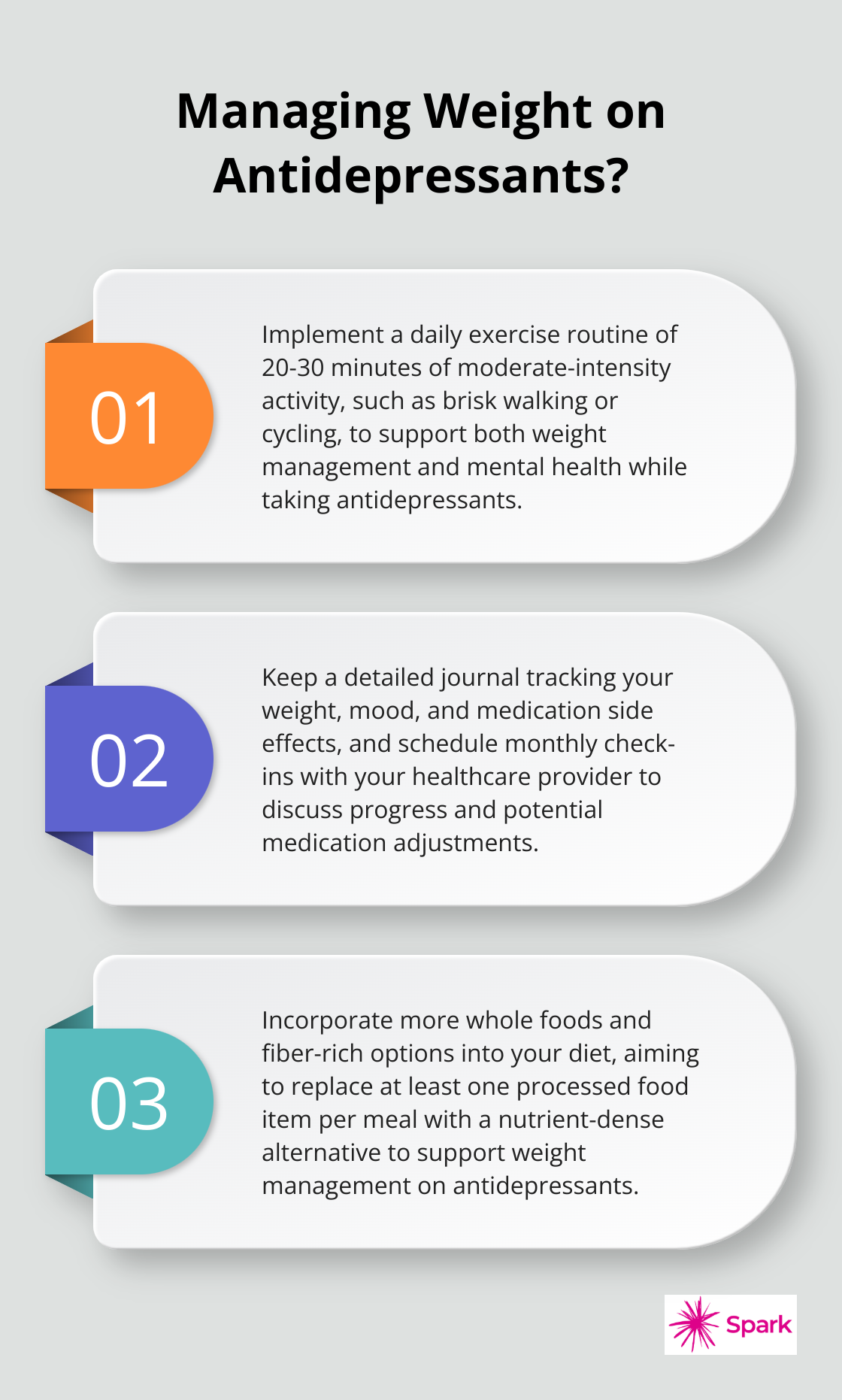Depression and weight management often go hand in hand, presenting unique challenges for those seeking effective treatment.
At Spark Healthcare, we understand the importance of addressing both mental health and weight concerns simultaneously.
In this post, we’ll explore the best depression medications for weight loss and management, offering insights into antidepressants that can help you maintain a healthy weight while improving your mood.
The Depression-Weight Connection: A Complex Interplay
Understanding the Relationship
Depression and weight changes often create a challenging cycle for those affected. Many individuals with depression experience significant weight fluctuations, either gaining or losing pounds rapidly. These shifts can result from changes in appetite, energy levels, and motivation to maintain healthy habits.
Impact on Eating Patterns
Depression frequently alters eating patterns. Some individuals turn to food for comfort, which leads to weight gain. Others lose interest in eating altogether, resulting in unintended weight loss. Research has shown that cognitive deficits are a major adverse outcome of late-life depression, and prominent appetite loss during acute depression may be a marker for these deficits.
Weight’s Influence on Mental Health
Weight issues can contribute to or exacerbate depression. Research has confirmed a reciprocal link between depression and obesity. Obesity was found to increase the risk of depression, most pronounced among Americans and for long-term follow-up.
Navigating Treatment Challenges
Tackling depression and weight issues simultaneously presents unique obstacles. Antidepressants, while effective for mood improvement, can sometimes lead to weight gain. The symptoms of depression (such as fatigue and lack of motivation) can make it difficult to maintain a healthy diet and exercise routine. This creates a complex situation where treating one condition may inadvertently worsen the other.
A Comprehensive Approach
Effective treatment requires a comprehensive plan that supports both mental and physical well-being. It’s not just about finding the right medication; it’s about creating a strategy that addresses both aspects of health.

In the next section, we’ll explore specific antidepressants that can help manage depression while minimizing weight-related side effects, providing valuable insights for those seeking to balance their mental health and weight management goals.
Antidepressants That Support Weight Management
Bupropion: A Weight Loss Ally
Bupropion (brand name Wellbutrin) stands out as an antidepressant that can promote weight loss. Unlike many other antidepressants, bupropion doesn’t typically cause weight gain. A 2016 study found that antidepressant drug therapy is significantly associated with long-term weight change at two years, and bupropion may be considered as the first-line drug of choice.

Bupropion increases levels of norepinephrine and dopamine in the brain. This mechanism alleviates depression and may reduce appetite and boost metabolism. For individuals struggling with both depression and weight gain, bupropion offers a compelling option to discuss with a healthcare provider.
Fluoxetine: Short-Term Weight Benefits
Fluoxetine (Prozac) may offer benefits for weight management, particularly in the short term. One trial comparing fluoxetine 60 mg/d with no treatment showed a weight loss from 0 to 3 months.
The weight loss effects of fluoxetine tend to be most pronounced in the first few months of treatment. Over time, some individuals may see this effect diminish or reverse. However, for those needing a short-term solution that addresses both depression and weight concerns, fluoxetine presents a viable option.
Sertraline: Maintaining Weight Stability
Sertraline (Zoloft) might suit individuals who primarily want to avoid weight gain while treating their depression. While it doesn’t typically lead to weight loss, sertraline is generally considered weight-neutral, especially compared to other antidepressants.
A large-scale study published in 2024 found that sertraline users gained, on average, only 0.5 pounds after six months of treatment, and 3.2 pounds at 24 months. This minimal weight change makes sertraline an attractive option for those who want to maintain their current weight while addressing their depression.
Individual Responses Vary
It’s important to note that individual responses to antidepressants can vary significantly. What works well for one person may not be the best choice for another. Factors such as genetics, lifestyle, and overall health can influence how a person responds to a particular medication.
Consulting with Healthcare Professionals
A healthcare professional can help determine the most appropriate treatment plan for your specific needs and circumstances. They will consider your medical history, current symptoms, and weight management goals when recommending an antidepressant.
While these medications show promise in supporting weight management, they should not be viewed as weight loss drugs. Their primary purpose remains the treatment of depression, with potential weight benefits as a secondary consideration.
As we explore strategies to minimize weight gain with antidepressants in the next section, it’s clear that medication choice is just one part of a comprehensive approach to managing both depression and weight.
How to Manage Weight While Taking Antidepressants
Combine Medication with Lifestyle Changes
A holistic approach combines antidepressant treatment with lifestyle modifications. Increase your physical activity gradually. The U.S. Department of Health suggests 150 to 300 minutes of moderate-intensity exercise weekly for substantial health benefits. This doesn’t require daily gym visits; small increases in daily movement can make a difference.

Focus on your diet. Choose whole foods rich in nutrients and fiber. These foods promote satiety and provide essential nutrients that support mental and physical health. Limit processed foods and added sugars, which can contribute to weight gain and mood fluctuations.
Monitor Your Progress Regularly
Weight changes occur gradually. Keep track of your weight and feelings. Use a journal or app to record your weight, mood, and any side effects you experience. This information will prove valuable for your healthcare provider.
Schedule regular check-ins with your psychiatrist or primary care physician. These appointments allow you to discuss your progress and any concerns. If you experience significant weight gain, your doctor might consider adjusting your medication dosage or switching to a different antidepressant.
Don’t focus solely on the scale number. Pay attention to how your clothes fit and your overall energy levels. These can indicate changes in your body composition.
Communicate Openly with Your Healthcare Team
Your healthcare providers are your allies in this journey. Be honest about your concerns and goals. If weight gain worries you, inform your doctor from the start. They can tailor your treatment plan accordingly.
Ask questions about your medication. Understanding how it works and what side effects to expect can help you manage them more effectively. Discuss any supplements or major lifestyle changes with your doctor first to ensure they won’t interfere with your treatment.
Consider Alternative Medications
If weight gain persists despite lifestyle changes, discuss alternative medications with your doctor. Some antidepressants may have different effects on weight. Your doctor can help determine if switching medications is appropriate for your situation.
Seek Additional Support
Managing weight while taking antidepressants can be challenging. Don’t hesitate to seek additional support. This might include working with a nutritionist, joining a support group, or engaging in therapy to address any emotional eating patterns. A comprehensive approach (involving multiple healthcare professionals) often yields the best results.
Final Thoughts
The best depression medication for weight loss differs for each individual. Bupropion, fluoxetine, and sertraline offer potential benefits for those who want to address depression without significant weight gain. A personalized treatment approach proves essential, as what works for one person may not be effective for another.

Professional guidance marks the first step towards better mental health and weight management. Spark Mental Health provides personalized, evidence-based telepsychiatry services to help navigate these challenges. Our experienced professionals develop tailored treatment plans that address both mental health needs and weight management goals.
Seeking help demonstrates strength, not weakness. Professional support can significantly impact your journey towards improved health and well-being. The right combination of medication, lifestyle changes, and ongoing support enables effective management of depression while maintaining a healthy weight.






